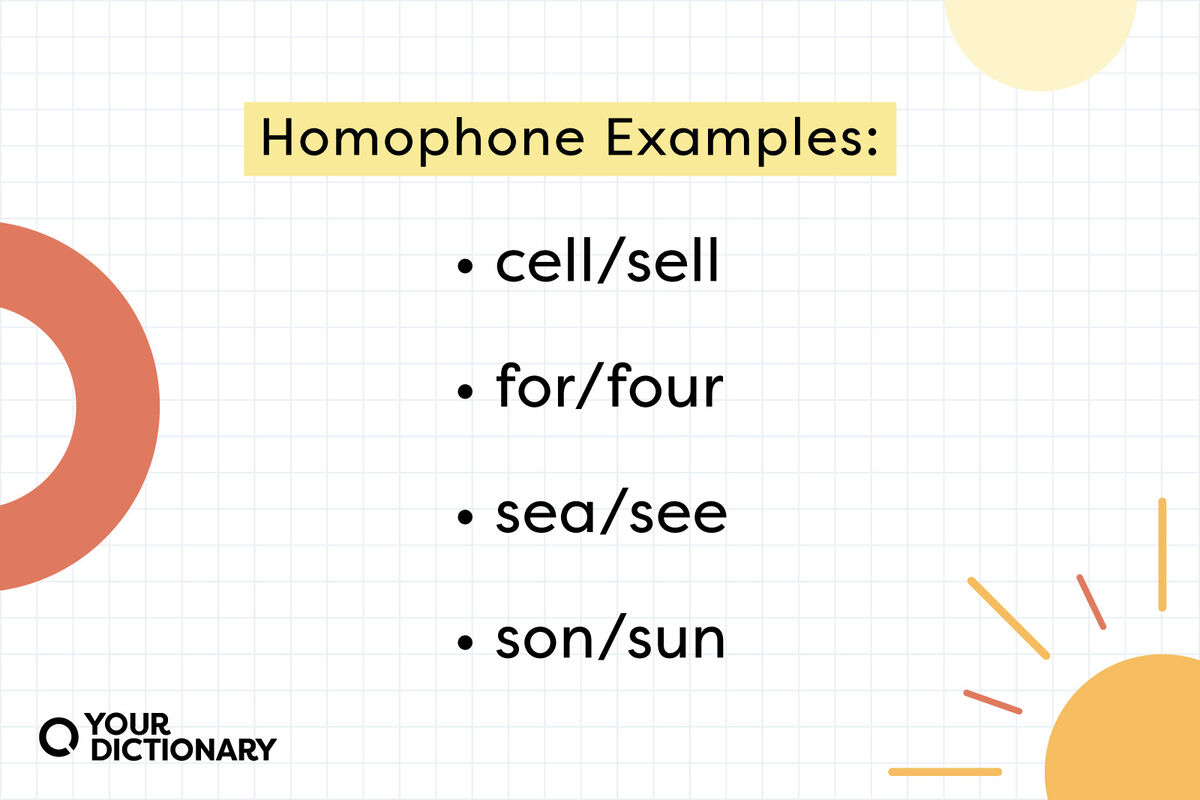
Homophones are pairs of words that sound the same, but have distinctly different meanings and different spellings. Understanding homophones is an essential part of mastering the English language, both for vocabulary building and spelling.
20 Common Homophone Pairs
Some common examples of homophones, including the words used in a sentence, are:
- brake/break: When teaching my daughter how to drive, I told her if she didn't hit the brake in time she would break the car's side mirror.
- cell/sell: If you sell drugs, you will get arrested and end up in a prison cell.
- cent/scent: I won't spend one cent on a bottle of perfume until I know that I love the scent.
- die/dye: If you accidentally drank a bottle of fabric dye, you might die.
- flour/flower: To bake a flower-shaped cake, you’ll need some flour.
- for/four: I purchased four new pairs of shoes for my upcoming vacation.
- heal/heel: If the heel breaks on your shoe, you might fall. However, your injuries will heal over time.
- hear/here: I wanted to sit here so I could hear the singer performing without any distractions.
- hour/our: We have one hour before our appointment with the real estate agent.
- idle/idol: Being idle makes me unhappy, but listening to my idol Taylor Swift makes me happy.
- knight/night: The knight is on his way to the castle, but traveling at night is very dangerous.
- knot/not: I do not know how she learned to tie the knot to make that necklace.
- poor/pour: I pour drinks at a bar every night. I am poor because I have too many bills and not enough money.
- right/write: There is no right way to write a great novel.
- sea/see: At my beach house, I love to wake up and see the sea.
- sole/soul: I need to get a new sole put on my favorite pair of running shoes. Jogging is good for my soul.
- son/sun: My son is 13 years old. He likes to spend time outside in the sun.
- steal/steel: Someone who decides to steal a car has committed a crime, but auto parts are made of steel.
- tail/tale: My cat was crazily chasing his tail while I read a fairy tale to my children.
- weather/whether: I don’t know whether to bring a jacket or not. The weather looks unpredictable today.
Frequently Confused Homophones
There are several homophones in the English language that almost everyone gets confused at some point. These frequently confused homophones include:
- accept/except: Accept is a verb that means to take or receive. Except is used as a preposition or conjunction to mean but or exclude.
- affect/effect: Affect is a verb (in most cases) and indicates influence. Effect is a noun (in most cases) and is the result of an action or change.
- compliment/complement: Compliment means to say something nice about someone or something. Complement means something that enhances or completes.
- then/than: Then is a versatile word used as an adverb, noun or adjective to show the order of how things happened. Than is a subordinating conjunction you can use to make comparisons.
- to/too: To can be a preposition or infinitive when used with a verb. Too is an adverb or a synonym for also.
- you're/your: You're is a contraction for you are. Your is a pronoun.
Homographs and Homonyms
Homophones are often confused with homographs and homonyms. These terms are similar, but there are some important differences to consider.
Homographs are words which are spelled the same, but have different meanings and are not necessarily pronounced the same. One example is the word bow, which has several meanings pronounced two different ways, such as a weapon for shooting arrows, or to bend at the waist.
Homonyms are words with the same spelling and pronunciation, but different meanings, which means they are simultaneously homographs and homophones. Take for example the word band, meaning a group or a ring.
Activities for Teachers
Native English speakers often grasp the concept of homophones with minimal effort, but students learning English as a second language may need extra practice. Consider the following ideas:
- Write the homophones on index cards, then use the cards to play a game like Memory or Go Fish.
- Play Pictionary by dividing students into teams. Ask the groups to take turns illustrating and guessing homophone pairs.
- Use sample sentences with blank spaces to help students learn how identify the correct homophones based on contextual cues.
- Have students make an A to Z list of homophone pairs using all of the English homophones they know as well as examples from their native language.